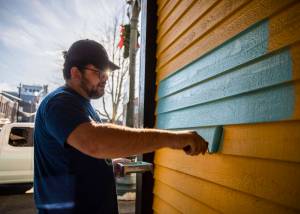High food prices hurt Egyptians
Published 8:55 pm Saturday, May 31, 2008
CAIRO, Egypt — The men eat mashed beans with onions and garlic, mixing in hot sauce and drinking water from the same tin cup, all of them watching Nabil Helmy stir his ladle in a deep pot.
Helmy is not much of a talker, but the guys spooning up his beans, known as faoul, have plenty to say, sometimes even mentioning the cost of Helmy’s breakfast, which has nearly doubled to 41 cents. What can he do? Inflation. The men spit that word out like a bad pepper.
Said Nazir said these days he can afford only donkey meat sausages for dinner, which his cat won’t even touch.
Hani Salem, a plainclothes police officer, wants to know how you can raise a child — his wife is pregnant with their first — on $67 a month.
That doesn’t sound bad to Ahmed Ali Mahmoud, who left the sugar cane fields to seek his fortune in Cairo only to find a job parking cars and to sleep on the floor of a garage owned by Sedgi Hafez, who, with a propane flame and a battered kettle, sells tea on the corner and tends to his wife and seven children.
Worried about lunch
This is Egypt, guys eating breakfast, worried that the ever-slimming fold of bills in their pockets won’t get them through lunch. The faoul stand is where they come for sustenance, where they come to gripe. It’s the corner bar on a donkey cart, no booze but plenty of hot beans and shredded vegetables. Hundreds of faoul stands steam and rattle on the streets and alleys of Cairo; they endure, like the mosques and the curved banks of the Nile. Cops eat for free; everyone else pays.
Helmy’s setup is in the shade on a street packed with offices, apartments and delivery boys who dart like skipping stones through traffic. There’s a newsstand across the way, the guy who runs it has quick hands and suspicious eyes. The buzz of flies plays alongside radio music and sometimes a chanted verse from the Quran softens the air until it’s chased away by a truck horn or a dog barking or Helmy’s ladle scraping the pot.
Nazir slips out of his government office every morning and orders the usual. He likes what Helmy does with beans, cooked just right, but he’s disappointed in the bread, so he adds onion and cabbage at no extra charge. He eats like a man driving a getaway car. He wipes the grease from his hands and lights a cigarette, sweat shining in his curly hair, heat creeping through the shade of the trees.
Inflation takes toll
“Back when I married in 1989, my salary could just make ends meet,” he says. “But now 20 pounds (about $4) vanishes quicker than it used to. I can’t keep going on like this. We can’t afford real meat anymore. Sometimes we buy a chicken carcass and boil it just to taste the flavor of meat in the broth. It can’t keep going this way.”
But it does. The newspapers are full of explanations, macro-economic stuff and political jargon, but all that the men around Helmy’s pot know is that breakfast is more expensive and so is everything else, whether it’s related to soaring global food prices, government corruption or the whim of the market.
Does government help?
That naturally spins conversation toward you-know-who — President Hosni Mubarak. He gave public employees a 30 percent raise, but days later the government raised gas prices to pay for it.
“The president gives us a 30 percent raise with his right hand and takes it away with his left,” said Salem. “I make 360 pounds ($67) a month. But my wife has needs. My child will have needs. One kilo of meat costs 30 pounds. Where will I get that? People are still fighting in the bread lines.”
He pointed to Helmy’s stand, a cart with chipped wheels and scattered with plates, salt bowls, cut peppers and men nudging for space.
“Look at that cooking oil. That costs 11 pounds now. It used to be only 3. I don’t have another job. I don’t want to work for the private sector. They suck your blood for 12 hours a day and pay you nothing. God knows what’s next. Maybe we’ll have to sell our clothes,” Salem said.
Mahmoud keeps his dreams small. He left his family and the farm fields of Upper Egypt three months ago. He’s 19 and parks cars every day from 5 a.m. to 11 p.m. for $36 a month. He’d like to get married, build a house and open an auto parts store back home, but that seems as likely as his reaching out in the desert night and touching the moon.
“I can’t even afford cigarettes,” he said.
Twenty years — that’s how long Hafez has been boiling tea on a corner blackened by his flame.
He arrived from Upper Egypt when he was 10; now he’s 60 and more cranky, keeping his sugar clean and supervising Mahmoud and the other parking boys.
“Nothing’s changed on this corner, it’s only gotten more crowded,” he said. “Selling tea doesn’t make enough money, so I park cars too. I’m old and there’s nothing else I can do. I’ve got seven children, and the youngest is 4, a daughter.”
Wife lends a hand
He turns toward his wife, Gamalat. She’s her husband’s backup, keeping tabs on the parking boys. She’s 41, and she moved here from Upper Egypt, too. She was 15, and it was arranged that she’d marry her cousin, Hafez, a man with a business in a big city that she had only seen on TV.
Now she’s known as “Ahmed’s mother,” following the tradition of calling a woman by the name of her eldest son.
“I have to stand by these cars all day, otherwise I couldn’t feed my kids. Things started going bad five or six years ago,” she said.
“I don’t want my children parking cars. I want them to have something, a passion for the future. My one daughter is studying computer science.”
She walked into the shade, telling one man to back his car up and another to go forward.
It’s pushing noon. Nazir was back at work. Salem walked his beat. There was a new crowd at Helmy’s faoul stand.
The ladle scrapes, faces press in, hands grab for diced onions and hot sauce, a tin cup is passed.




